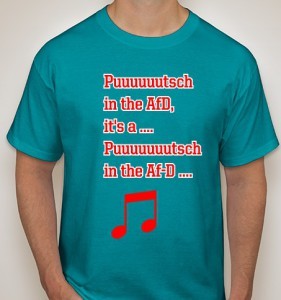Putsch in the AfD!
This morning, I woke up to the news that Andre Poggenburg, former leader of the AfD in Saxony-Anhalt and former chair of the AfD’s delegation in the state parliament is now also a former member of the AfD. And thanks to @TheDanHough, I quickly learned that he has already set up his own party: “Awakening of German Patriots – Central Germany” (AdP). In other words, they are playing our special song. Once more, with feeling.

Who is Andre Poggenburg?
The AfD began its life as a moderately Eurosceptic party to the right of the Christian Democrats. During its first two years, the AfD’s public image was dominated by men (mostly) that could have been members, or had in fact been members, of the postwar German centre-right parties. The gradual radicalisation of the party became more visible in 2015. By the end of 2015, the AfD had become a bog-standard Radical Right party.
The AfD’s transformation was sped up by circles on the very right of the party, chiefly based in former East Germany. As leader in Saxony-Anhalt, Poggenburg was a relatively prominent representative of these forces, although he always played second fiddle to Björn Höcke, who leads the AfD in Thuringia. In 2016, Poggenburg led a state-level campaign that was unusually aggressive even by the new standards of the AfD, and won their best result ever (so far): 24.3 per cent of the vote.
While most European Populist Radical Right parties shy away from traditional right-wing extremism and draw a (sometimes thin) line between themselves and those who openly campaign against democratic values and principles, the Eastern chapters of the AfD are remarkably relaxed in this respect. As early as 2015, Höcke voiced sympathy for not just voters but also for members of the right-wing extremist NPD. On other occasions, he has shown thinly veiled support for biological racism and has demanded that Germany performs a “U-turn” with respect to its attempts to come to terms with the Nazi past. Whenever Höcke came under fire from more moderate characters in the party, Poggenburg rose to his defence.
Poggenburg’s political positions and style are hardly different from Höcke’s. For years, the two men were allies, and perhaps even friends. But more recently, Poggenburg became a bit of an embarrassment, and his political star began to sink. His power grabs, his iron-fist approach to intra-party opposition and his chaotic, undisciplined leadership put off many party members in Saxony-Anhalt. As early as 2016, it emerged that Poggenburg, who was a small business owner before becoming a full-time politician, had not paid back money that he owed and had hidden from the bailiffs on several occasions. In 2017 Poggenburg was accused of nepotism when it became known that the AfD employs his girlfriend as a trainee. All in all, he is not exactly a model law-and-order politician.
And so Poggenburg lost first his influence within the Eastern right-wing circles, then his seat on the national executive (in 2017), and finally, in 2018, his leadership positions in Saxony-Anhalt.

His real problem, however, is that he lacks Höcke’s air of pseudo-intellectualism and does neither understand the concept of (im)plausible deniability nor the need for tactical moderation. In various states and at the federal level, authorities are currently pondering the question whether the AfD is an extremist party and should hence come under surveillance by the secret service. Such a move would not just be inconvenient but would put off many voters and would probably lead to a mass exodus of members who fear for their careers. Because of this threat, the national leadership is consulting with constitutional lawyers and has compiled a list of words and phrases that should be avoided because they are too obviously beyond the democratic pale.
Poggenburg baulked at this. He complained, without apparent irony, about a “lurch to the left” within the AfD. He began using a blue cornflower as his header image on social media, a symbol that was used by anti-semitic parties in Austria and Germany in the 19th century and became the shibboleth of the then-illegal Nazi party in pre-1938 Austria. And finally, Poggenburg kicked off 2019 by sending “patriotic well-wishes” to the “Volksgemeinschaft” (the community of the people)- a Nazi-era term that was used to legitimise first the exclusion, then the murder of Jews, socialists, communists, homosexuals, Roma, and anyone else who did not fit into the totalitarian vision of German society.
A couple of years ago, that might have been worth a half-hearted explanation (“I misstyped …”), but in the current climate, the national executive decided to ban Poggenburg from holding party offices for two years. And so the man left, then made his announcement, all just in time for a slow-news Friday and for the upcoming AfD party conference.
What are the likely consequences of this split?
Glad that you ask. The AfD has previous form for de-facto splits. In 2015 and 2017, the respective leaders left and went on to set-up their own parties: Lucke’s ALFA (now LKR) and Petry’s Blue Party. Ironically, both were self-styled moderates that broke with the AfD over its radicalisation (that they had furthered, up to a point). Poggenburg, on the other hand, is a true radical who leaves over the party’s alleged moderation.

Three and a half year down the line, ALFA/LKR is dead in the water. The Blue Party looks pretty blue on the national level (could not resist – sorry), but may play a role in the upcoming election in Saxony, where it has a small parliamentary presence due to defections from the AfD. But by and large, there seems to be no demand for an entirely moderate AfD: voters can simply return to the centre-right, especially now that Merkel’s chancellorship is coming to a close.
Poggenburg’s AdP is a completely different proposition. He is aiming for East Germany (or Central Germany in his parlance) only, and heplans to out-AfD the AfD in the East German elections of 2019. That could work if Eastern voters were of the opinion that the AfD is indeed lurching to the left, selling out, etc., etc., etc. But so far, the AfD’s numbers in the polls look pretty solid. The Eastern state party chapters already operate to the right of most Western chapters. They have access to state funding that their parliamentary presence has earned them, they have party machines in place, and they have a cohort of reasonably seasoned politicians. Poggenburg, on the other hand, has all the experience of winning an election, then blowing it.
It’s early days still (the first day, actually), but so far, Poggenburg has only convinced two semi-prominent right-wingers to jump ship and join his new outfit. With this small team, he is mainly gunning for the small-ish group of voters that have previously supported the NPD. But even these voters might still find the AfD reasonably attractive and will be reluctant to potentially waste their vote. In 2019, the AfD is an established brand whereas the AdP, which has adopted the cornflower symbol, looks like a radicalised knock-off lead by a man who has previously overestimated his political capital by a considerable margin.
My colleague Hans Vorländer has speculated on public radio that Höcke might want to join the party (groan! enough with the puns!). Without doubt, that would be a game-changer.
But why would Höcke do such a thing? Höcke was instrumental in transforming the AfD. he division of labour between the AfD’s more respectable and its more radical/revolutionary wing has paid off handsomely for both, and the current national executive is willing to give Höcke and his associates considerable leeway. Not a single word of support for Poggenburg has come from Höcke in all of 2018. And so I think that this split will be as inconsequential as the last ones. But then again, I have been completely wrong before.
Discover more from kai arzheimer
Subscribe to get the latest posts sent to your email.



RT @kai_arzheimer: From the vault: The AfD splits again. This is why you should care. Perhaps https://t.co/PwyoPq6FxS
The AfD splits again. This is why you should care. Perhaps https://t.co/EPvcex5HHn vía @kai_arzheimer
RT @kai_arzheimer: Oh joy, oh fun, another #AfD has-been is gifting us with another far-right party, this one aimed exclusively at East Ger…
RT @kai_arzheimer: Germany’s #AfD splits once more. Here is what you may want to know #Poggenburg #RadicalRigh
https://t.co/AiYYQyBF5b http…
The AfD splits again. This is why should care. Perhaps https://t.co/zxKyxqmUVL
RT @kai_arzheimer: Oh joy, oh fun, another #AfD has-been is gifting us with another far-right party, this one aimed exclusively at East Ger…
RT @kai_arzheimer: Oh joy, oh fun, another #AfD has-been is gifting us with another far-right party, this one aimed exclusively at East Ger…
RT @kai_arzheimer: Oh joy, oh fun, another #AfD has-been is gifting us with another far-right party, this one aimed exclusively at East Ger…
Deliciously snarky @kai_arzheimer on the newest AfD drama https://t.co/QPL3Cy3EL9 Enjoy!